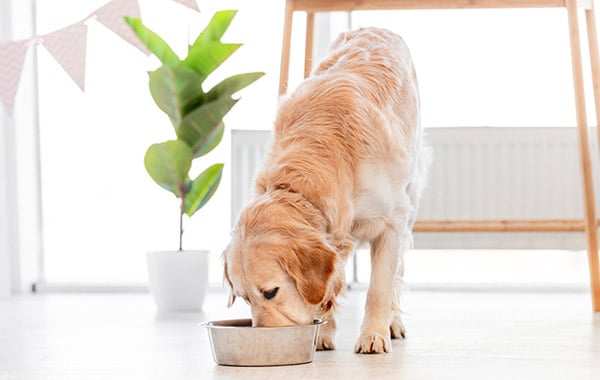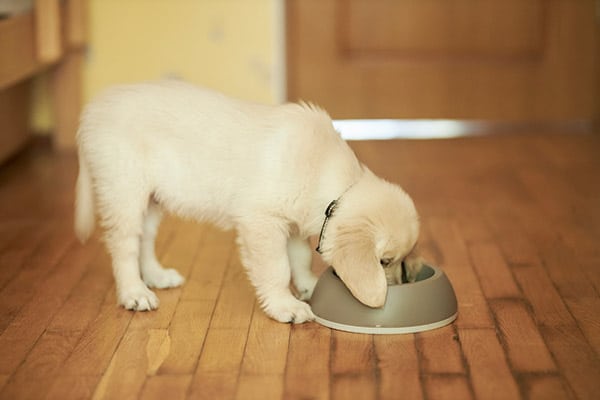If you’re a new Golden Retriever owner, then you might be wondering what the best diet for your pet is.
The answer to this question can vary depending on the individual dog and their specific needs, but there are some basic tips that could help make feeding time easier for both of you.
Keep reading for more details on how much a Golden Retriever should eat as a puppy and adult dog.
How Much Food To Feed Your Golden Retriever

The actual size of your dog’s food portions will depend on their size and activity level, but as a general rule, you should allow them one cup of food each day (and two meals).
When your Golden is a puppy, you will need to feed him three times each day since he is a growing pupper.
After six months of age, you will also want to feed your dog twice per day, once in the morning and once at night.
The actual size of your dog’s food portions will depend on their size and activity level, but as a general rule, you should allow them one cup of food each day (and two meals).
Many dog food products are out on the market, promising the best outcomes for your dog. But stay keen and choose a dog food recommended by a veterinarian who personally checked your furry friend.
If you are concerned about your dog’s weight, consult a vet and they may recommend changing some of the ingredients in their diet or adding more exercise into their daily routine.
If you have an especially big Golden Retriever who is still growing (or if he/she is not very active), don’t overfeed him/her with too many treats because this can lead to health problems such as obesity and diabetes later down the road!
On the other hand, if your Golden Retriever has been properly sized for his age/size but needs extra exercise due to lack thereof during youth then try including some new activities like swimming or walking more often than usual so that he does not become overweight from lack of activity during these early stages before entering adulthood where most dogs begin slowing down naturally due to old age being closer than ever before!
Keep in mind that Golden Retrievers are a large breed and have a high energy level, which means they need more calories than other breeds.
In fact, pound for pound they consume up to 35 more calories per kilogram of body weight than many other dogs.
To meet this higher calorie requirement, you will either need to feed your Golden Retriever more food or decrease its exercise level.
Why It’s Important To Give Your Golden A Good Diet

In reality, any dog needs to have the right diet in order to stay healthy.
Without the right amount of food, he could develop health problems that could prevent him from being the best dog he possibly can be.
If you want your Golden Retriever to reach his full potential and be happy, you need to make sure that he has a balanced diet with plenty of nutrients and vitamins. You also need to make sure that he gets enough exercise so that he stays fit and doesn’t get overweight or obese.
Golden Retrievers are active dogs, so they need plenty of exercise.
If you don’t give your Golden a chance to run around every day, he could develop health problems and become overweight or obese.
Not only will this prevent him from being able to do the things that he loves doing like playing fetch or hunting birds; it could also shorten his lifespan by several years.
Exercise Is An Important Part Of Your Golden’s Diet
A simple way to ensure your Golden Retriever is getting enough exercise is by simply timing the walk yourself.
You should allow at least 10 minutes per day.
A simple way to ensure your Golden Retriever is getting enough exercise is by simply timing the walk yourself.
You should allow at least 10 minutes per day.
If you have a smaller yard, this can be problematic.
Your dog may not get enough exercise in a small yard, so consider taking them out on longer walks or consider an enclosed area where they can run around freely without being distracted by other dogs and people (this will keep them from barking).
If you have a big yard, make sure that you are keeping it clean and free of any obstructions that could trip over during playtime!
Don’t Feed Your Golden Retriever Too Much Food
Careful not to overfeed your Golden Retriever as it can cause obesity, which can lead to heart disease, diabetes and many other health issues.
Feeding your dog too much or not enough can lead to obesity, which can lead to heart disease, diabetes and many other health issues.
Remember that Golden Retrievers are active dogs with very high energy levels so you need feed them a high quality diet that’s rich in protein, fat and fiber.
However, it’s very important not to overfeed them as this will cause weight gain and all the problems associated with being overweight.
A good way to monitor your dog’s weight is by weighing them regularly using a bathroom scale or weighing scales at the vet’s office (they’re often free).
A healthy adult Golden Retriever should weigh between 55-75 pounds but this varies depending on gender.
Obesity is becoming more common among dogs in general and can even lead to early death, so it’s important to monitor your pet’s weight if you want them to live a long life with minimal health issues.
While obesity is becoming more common among dogs in general and can even lead to early death, it’s important to monitor your pet’s weight if you want them to live a long life with minimal health issues.
If your Golden Retriever is especially food-disinclined, there are a few things you can do to help them lose weight:
- Add some exercise into their daily routine. A walk or two around the block every day will give them some much-needed exercise and reduce their appetite.
- Cut back on treats, especially ones with high sugar content like chocolate or candy corn. This will also help reduce their overall calorie intake each day; however, if they’re already overweight then this may not be enough by itself!
Train your Golden Retriever by providing a balanced diet with high-quality dog food tailored to their needs. Establish a consistent feeding schedule, follow portion recommendations, and avoid table scraps. Use healthy treats in moderation, monitor your dog’s weight, and reinforce positive eating behavior. If eating too quickly is an issue, consider slow-feed bowls.
But also watch out for the common symptoms of digestive upset.
Vomiting, diarrhea, abdominal discomfort, lack of appetite, increased gas, weight loss, lethargy, changes in water consumption, straining during bowel movements, and blood in stools aren’t normal.
If your dog is unwell, it may lose its appetite. Various health issues, including infections, digestive problems, dental issues, or systemic illnesses, can affect a dog’s desire to eat.
Changes in the environment, routine, or the presence of new people or pets can cause stress, leading to a decreased appetite.
A sudden change in diet, food allergies, or sensitivity to certain ingredients can result in a reluctance to eat. Older dogs may experience a decline in appetite due to age-related factors or underlying health conditions.
